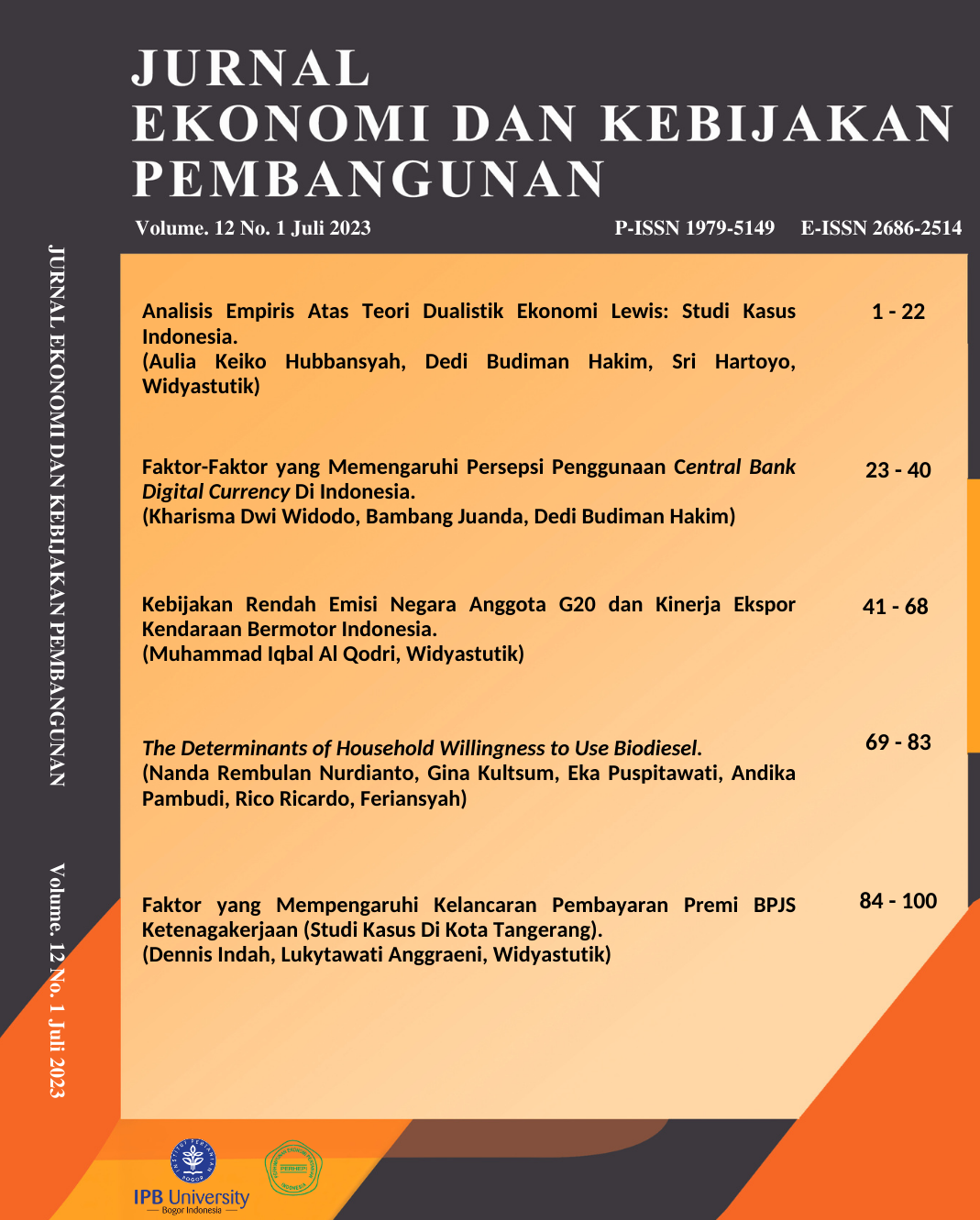Factors Affecting Perception of Central Bank Digital Currency in Indonesia BPS, IPB University
Abstract
The increasing use of private digital currency can affect the effectiveness of the monetary policy, putting the government under pressure to adopt the Central Bank Digital Currency (CBDC). This study aims to analyze the factors that influence economic actors in the use of CBDC. The results showed that the effectiveness and safety may increase the consumer satisfaction with using CBDC and the publicity influences changes in the behavior of economic actors in increasing the conversion of fiat money to CBDC.
References
Abdillah, W., Jogiyanto. 2015. Partial Least Square (PLS) – Alternatif Structural Equation Modeling (SEM) dalam Penelitian Bisnis. Yogyakarta: Andi
Affandi, Y., Harahap, B.A., Bary, P., Kusuma, A.C.M. & Rakhman, R.N. (2016). Dampak Financial Technology pada Makroekonomi dan Moneter. Laporan Hasil Penelitian DKEM.
Akmaliyah, D. (2017). Faktor-faktor yang Mempengaruhi Minat Pembelian Ulang Kartu E-Money Bank Mandiri. Skripsi. IPB University.
Bank Indonesia. (2019). Blueprint Sistem Pembayaran Indonesia 2025. https://www.bi.go.id/id/fungsiutama/sistem-pembayaran/blueprint2025.
Bank Indonesia. (2022). Statistik Sistem Pembayaran dan Infrastruktur Pasar Keuangan. https://www.bi.go.id/id/statistik/ekonomi-keuangan/spip.
Bank Indonesia. (2022). Proyek Garuda: Menavigasi Sistem Arsitektur Digital Rupiah. https://www.bi.go.id/id/rupiah/digital-rupiah/Documents/White_Paper_CBDC-2022.pdf
Bayu, N.K. (2019). Analisis Faktor-faktor yang Memengaruhi Perkembangan E-money sebagai Alat Transaksi di Jakarta. Skripsi. IPB University.
Bech, M.L. & Garrat, R. (2017). Central Bank Cryptocurrencies. BIS Quarterly Review, pp. 55-77.
Boar, C., Holden, H., & Wadsworth, A. (2020). Impending arrival–a sequel to the survei on central bank digital currency. BIS paper, (107).
CBDC Tracker. (2022). Today’s Central Bank Digital Currencies Status. https://cbdctracker.org/
Chin, W. W. (1998). The Partial Least Squares Approach to Structural Equation Modeling. Modern Methods for Business Research, 295-336.
Committee on Payments and Market Infrastructures (CPMI). (2018). Central Bank Digital Currencies. BIS.
Garson, G.D. (2016). Partial Least Squares: Regression and Structural Equation Models. Asheboro: Statistical Associates Publishers.
Hair, J.F., Hult, G.T.M., Ringle, C.M., Sarstedt, M., Danks, N.P., Ray, S. (2021). An Introduction to Structural Equation Modeling. In: Partial Least Squares Structural Equation Modeling (PLS-SEM) Using R. Classroom Companion: Business. Springer, Cham.
Haryono, S. (2016). Metode SEM Untuk Penelitian Manajemen dengan AMOS 22.00, LISREL 8.80, dan Smart PLS 3.0. Bekasi: PT. Intermedia Personalia Utama.
Hendarsyah, D. (2016). Penggunaan Uang Elektronik Dan Uang Virtual Sebagai Pengganti Uang Tunai di Indonesia. Jurnal Ilmiah Ekonomi Kita, Vol 5, No 1. doi: https://doi.org/10.46367/iqtishaduna.v5i1.74
Jabbar, A., Geebren, A., Hussain, Z., Dani, S., Ul-Durar. (2020). Investigating individual privacy within CBDC: A privacy calculus perspective. Research in International Business and Finance, Vol 6, 101826. doi: https://doi.org/10.1016/j.ribaf. 2022.101826.
Juanda, B. (2021). Ekonomi Eksperimental. Jakarta: PT Gramedia Pustaka Utama.
Juanda, B. (2009). Metodologi Penelitian: Ekonomi & Bisnis. Bogor: IPB Press.
Juanda, B., Irawan, T., Probokawuryan, M., Widodo, K.D. (2022). Desain Rupiah Digital sebagai Central Bank Digital Currency Indonesia dalam Upaya Mencapai Inklusi Keuangan dan Pemulihan Ekonomi. Laporan Hasil Penelitian. IPB University.
Kementerian Keuangan. (2022). ODADING: Mengenal Lebih Dekat Central Bank Digital Currency (CBDC). https://djpb.kemenkeu.go.id/direktorat/pkn/id/odading/2918-mengenal-lebih-dekat-central-bank-digital-currency-cbdc.html
Löber, K. & Houben, A. (2018). Committee on Payments and Market Infrastructures Markets Committee. BIS paper, 174.
Ngo, V.M., Nguyen, P.V., Nguyen, H.H., Tram, H.X.T., Hoang, L.C. (2022). Governance and monetary policy impacts on public acceptance of CBDC adoption. Research in International Business and Finance, Vol 6, 101865.doi: https://doi.org/10.1016/j.ribaf.2022.101865
People’s Bank of China. (2021). Progress of Research & Development of E-CNY in China. http://www.pbc.gov.cn/en/3688110/3688172/4157443/4293696/2021071614584691871.pdf
Salsabila, R.S. (2020). Penerapan SEM-PLS untuk Mengevaluasi Faktor yang Memengaruhi Indeks Pembangunan Manusia. Skripsi. IPB University.
Setyowawan, D. (2023). Dampak Central Bank Digital Currency Terhadap Inklusi Keuangan di Indonesia. Skripsi. IPB University.
Solimun, Fernandes AR, Nurjannah. 2017. Metode Statistika Multivariat Pemodelan Persamaan Struktural (SEM) Pendekatan WarpPLS. Malang: UB Press.
Sugiyono. (2008). Metode Penelitian Kuantitatif Kualitatif dan R&D. Bandung: ALFABETA
Vinuela, C., Sapena, J. & Wandosell, G. (2020). The Future of Money and the Central Bank Digital Currency Dilemma. MDPI.
We_Are_Social. (2017). Digital in 2017 Global Overview: A Collection of the Internet, social media, and Mobile Data from Around the World.
Authors

This work is licensed under a Creative Commons Attribution-NonCommercial 4.0 International License.
The authors who publis article(s) in Jurnal Ekonomi and Kebijakan Pembangunan have to understand and agree that the copyright of article published is owned by Jurnal ekonomi and Kebijakan pembangunan including to reproduce, distribute and sell this journal to public.





